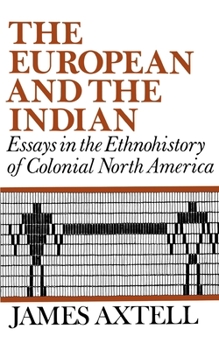The European and the Indian: Essays in the Ethnohistory of Colonial North America
Select Format
Select Condition 
Book Overview
Deals with the encounters of Europeans and Indians in colonial North America. A blending of history and anthropology, the author draws on a wide variety of sources, including archaeological findings, linguistics, accounts of colonists, art, and published scholarship.
Format:Paperback
Language:English
ISBN:0195029046
ISBN13:9780195029048
Release Date:February 1982
Publisher:Oxford University Press
Length:416 Pages
Weight:0.80 lbs.
Dimensions:1.0" x 5.3" x 7.9"
Customer Reviews
1 rating
excellent
Published by Thriftbooks.com User , 22 years ago
"No study of acculturation in colonial America would be complete," writes James Axtell in The European and the Indian: Essays in the Ethnohistory of Colonial North America, "without giving equal consideration to the question of how English culture was altered by its contacts with Native America." (272) Indeed, Axtell devotes the final chapter of his book to this view and concludes that colonial American culture experienced adaptive changes (a temporary, pragmatic adoption of Indian ways) and reactive changes ("spurred by the ubiquitous presence of the Indians as military foes and cultural foils.") (272-3) Reactive changes, Axtell argues, were most common to the settlement experience of the British, whose goal was to supplant the native population; he concludes that "where the natives were not regarded as superfluous obstacles, as in French Canada, adaptive changes were much more pervasive." One of the most obvious ways in which some English settlers adapted to their new land and neighbors was by literally "going native," a process Axtell calls "transculturation." (275) He points to the many instances of European whites adopting Indian customs and culture, particularly those closest to the frontier: longhunters, traders, missionaries, white captives and backcountry settlers. Axtell points to the fact that so many of the white captives in Indian hands refused to return to their own societies when given the opportunity as evidence of the profound impact native culture had on at least some British migrants to the New World. Axtell concedes that these "white Indians" removed themselves from British culture and therefore mitigated the influence their newly adopted ways had on those colonists back in the settlements. It was, however, "necessary for the colonists to borrow some of the Indians' time-tested skills techniques and technology for coping with the frontier environment." (284) "Indian means," Axtell contends, "were not borrowed in cultural context," but were taken piecemeal from the native way of life, selectively, for the benefit of the newcomers and their survival, as well as for the goal of cultural mastery. English settlers adapted to their new land by taking or borrowing numerous Indian techniques of agriculture, language, war, hunting, and to some extent, adopting medicinal practices which relied on native (and heretofore unknown) plants and flora. It is well known that British newcomers to America borrowed numerous native words, many of which have been permanently added to our vocabulary (potato, canoe). Axtell points out however, that the colonists adopted elements of Indian speech "in distinct ways which minimized their normative impact on colonial culture." Words were added to colonial speech ways only when equivalent English words did not exist, and Indian tribal and geographic names were commonly anglicized in spelling and pronunciation (289) Although Axtell writes that "acculturation is a two way street," the English clear






